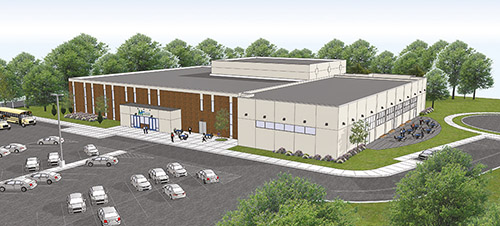



Ma’ayanot Yeshiva High School for Girls announced the launch of its long-awaited capital campaign project. Plans for the expansion and renovation of the school have been in the works since 2018, but progress ground to a halt when COVID hit in early 2020. Now, with the number of vaccinated people growing, the school can safely proceed with its plans.
The “Dream it, Build it, Live it” capital campaign project is an ambitious endeavor that provides a complete renovation of the existing space, as well as a 12,000-square-foot addition, greatly expanding the footprint of the building and allowing for more gathering spaces for students. Head of School CB Neugroschl shared, “The most important thing to me is that there’s a real understanding of the vision that the Ma’ayanot program is as expansive and holistic as it needs to be. It’s miraculous that we’ve been able to pull off what we have in our current facilities.”
Director of Development Beth Nussbaum previewed the new space, which will feature “an impressive performing arts center, with 20-foot ceilings, state-of-the-art audio visual equipment, a sound system and a stage for Heartbeats, drama productions and more.” The space will also include a student center with lounge area and outdoor patio space, where students can congregate, meet with teachers, have lunch or relax between classes. “All of the student programming can now have a home,” said Neugroschl.
Another main feature of the expansion is a new and expanded STEAM wing. “STEAM is a very big part of the renovation,” said Neugroschl. “It’s an example of how Ma’ayanot has shifted to deliver on personal growth. In the last few years, STEAM has been a core course at Ma’ayanot. Everyone gets that exposure, that design and problem-solving experience; that is an important STEAM component but also fundamental to Ma’ayanot’s overall program.” The STEAM space will boast new labs and completely upgraded equipment. The art studio, situated nearby, will allow for creative, interdisciplinary exploration between the arts and sciences. Multiple MakerSpaces and a reimagined library and media center—with collaborative and individual student work areas—reflect the changing and growing needs of students.
The project also includes plans for a larger beit midrash, which will provide enhanced opportunities for Torah learning, reworked classrooms, an updated health center and a dance/yoga studio. The expanded Learning Center will allow students to work in individual or small skill-building classes. The lobby and bathrooms are also getting an update. Every single space is being improved and upgraded with the purpose of meeting “contemporary education standards and preparing students for the 21st-century careers that await them,” said Nussbaum.
“Ma’ayanot has always been about excellence and sparking growth in every student, which is so crucial to these four years and happens on so many platforms,” said Neugroschl. This exciting new building is an “expression of investment in the mission and shows a much, much deeper commitment to push for excellence in personal growth in all creative spaces—performing arts, STEAM, even the outdoor dining patio is a setting for personal growth as it’s a space for students and teachers to connect. That the space matches that mission is so important.”
The school plans to break ground in June, after graduation, and complete the work over the summer. Any work that remains for the fall will likely be minor. Nussbaum reasoned that all the permits were procured at the initial phase of the project so now construction can proceed without delay.
Yosef Rubinstein, Ma’ayanot board president, shared that “the school is very focused on providing high-quality education and a great learning environment while also being responsible with our tuition dollars. We recognize that tuition is a challenge for our community. These plans were done purposefully and with a focus on common spaces and large rooms to allow for gathering and specialized spaces.” As the pandemic has eased, said Rubinstein, the board became concerned about rising scholarship costs, and though “the school fundraises for the scholarship program at its dinner, those dollars don’t cover” all costs.
To date, the school has raised $3.4 million in pledges toward its $5 million goal. “The investments have spanned the generations of the school, from old to new families and it’s been very energizing,” said Neugroschl. To meet its ultimate goal, Ma’ayanot is looking to the entire community to support its mission of excellent educational opportunities and maximum growth in an all-girls environment. “We’re asking for participation from the community as a whole to support our mission. This kind of education in an all-girls environment is unique and this [project] will facilitate taking it to the next level.” Rubinstein stressed that this is a “carefully constructed campaign resulting in an outstanding facility, but it’s not extravagant. It’s tailored to what the community needs; not over the top.”
Neugroschl shared, “The expansion plans focus on a holistic approach to learning and growth [incorporated] into the building. Having kids grow in all of the spaces, whether learning Torah in the beit midrash or academics in the classrooms or STEAM wing—Ma’ayanot excels in those areas, but the building hasn’t matched and this new environment will meet that.”
The school has sponsorship opportunities available for donors to commemorate their gifts. Due to the hiatus in the project, there are still ample opportunities, from campus naming to mezuzot in the classroom—and every level in between. “We’re hoping everyone can participate to the extent that they can,” shared Rubinstein.
The main thing this project will be giving Ma’ayanot students is space: space to connect, to innovate, to explore. As Neugroschl said, “Space to be inspired by the vision of holistic learning even during arts and lunch. This is core to building connections, community and a healthy, happy environment.”
Those interested in learning more about Ma’ayanot, its mission and the expansion can reach out to nussbaum@maayanot.org for more information.
By Michal Rosenberg









